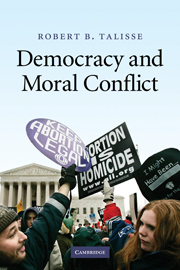5 - Epistemic perfectionism
Published online by Cambridge University Press: 03 December 2009
Summary
The argument thus far has been focused on highly theoretical questions concerning the reasons that can be given to citizens living in a morally divided society to sustain their commitment to a democratic political order, even in cases where such a commitment seems to conflict with their core moral convictions. In this final chapter, I begin by taking up a series of issues of a slightly more concrete nature concerning the state of contemporary democratic politics. With these issues addressed, I will make a case for thinking that a dialogically democratic society requires an epistemically perfectionist state. In the discussions with which the book concludes, I evaluate a few policy suggestions proposed by Ronald Dworkin.
DEMOCRACY AND PUBLIC IGNORANCE
The dialogical view of democracy that I have been developing expects a lot from democratic citizens. Dialogical democracy seems even more demanding than many of the deliberativist views, since it emphasizes the activities associated with truth-seeking and reason-exchanging. On the dialogical model, political decision is to reflect ongoing rational deliberation; thus, the dialogical view presupposes that citizens are epistemically capable of rational discourse. The kind of rational deliberation envisioned requires, at the very least, that citizens are able to draw correct inferences from given premises. More importantly, the dialogical conception of democracy presumes that citizens are capable of recognizing and understanding the basic political facts from which their deliberations are to begin.
- Type
- Chapter
- Information
- Democracy and Moral Conflict , pp. 156 - 192Publisher: Cambridge University PressPrint publication year: 2009



